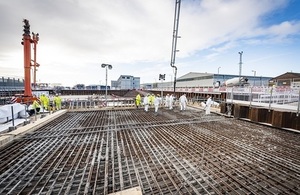- Creative industries contributed more than £111bn to the UK economy in 2018
- Advertising and marketing were two of the key drivers of growth in the Creative Industries
New government figures show the country’s successful creative industries contributed £111.7 billion to the UK in 2018, equivalent to £306 million every day.
This is up 7.4 per cent on the previous year, meaning growth in the sector is more than five times larger than growth across the UK economy as a whole, which increased by 1.4 per cent.
The sector was supported by large contributions from tech services and the film and television industries, which contributed £45.4 billion and £20.8 billion to the economy respectively. Another boost was delivered by the advertising and marketing industries, which account for a quarter of the total growth of the creative industries since 2017.
Minister for the Creative Industries, Nigel Adams, said:
The creative industries encompass the best and brightest of UK businesses and these figures paint a vibrant picture of creativity and talent in our country today.
I would like to congratulate all those within the sector whose hard work and ingenuity means the industry is making a staggering contribution of nearly £13 million to the national economy every hour.
As a whole, the Department for Digital Culture Media and Sport (DCMS) Sectors (excluding Tourism) contributed £224.1 billion to the UK in 2018, accounting for 11.7 per cent of the economy. Headline figures include:
The Digital Sector contributed £149 billion to the UK in 2018, accounting for 7.7 per cent of the UK economy. This contribution is up 7.9 per cent on the previous year, meaning growth in the sector is nearly six times larger than growth across the economy as a whole, which increased by 1.4 per cent.
The Cultural Sector contributed £32.3bn to the UK economy in 2018 – up 2.7 per cent from the previous year. The sub-sector ‘Film, TV and Music’ made up three fifths of this sector (£21.3bn).
The full DCMS Sectors Economic Estimates 2018 report can be found here.
Notes to Editors:
-
The Creative Scale-Up programme, funded by the Department for Digital, Culture, Media & Sport, will see £4 million invested across three regions in the UK giving creative businesses bespoke support to help them grow their business and become ready to take on investment. The programme will help boost opportunities for the creative industries which are worth over £100 billion to the UK economy.
-
In July 2019, the Culture Secretary Jeremy Wright announced plans for an apprenticeship scheme in the creative industries. The Department for DIgital, Culture, Media and Sport invested £100,000 to support the pilot ScreenSkills Apprenticeship Programme with matching funds from industry. The Government’s reforms to the apprenticeship system mean that apprenticeships are higher quality – at least 12 months, with more off the job training and with a proper assessment at the end.
